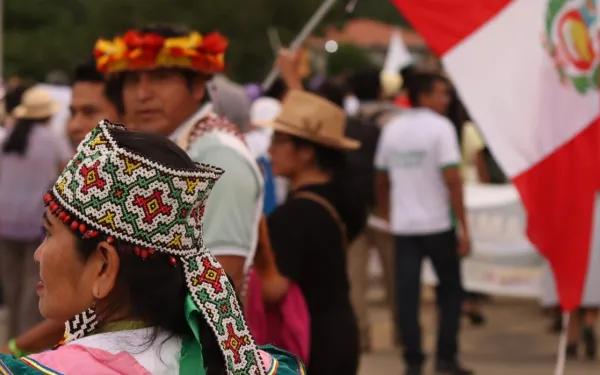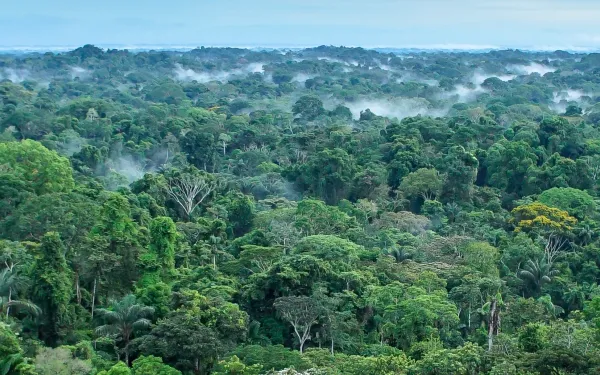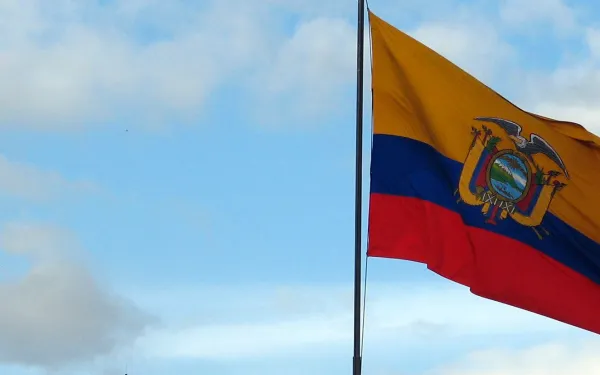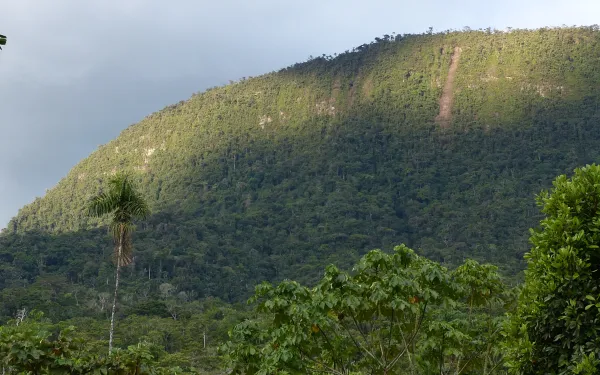Ecuador
Ecuador

The Amazon: The complexities and challenges of its protection
By Vania Albarracín and José David Castilla* Protecting the Amazon is one of the region's greatest challenges. Facing it requires coordination and cooperation between states, peoples and organizations. In this context, the Pan-Amazonian Social Forum (FOSPA) was born out of the need to think about the Pan-Amazonian region - a region made up of the countries that have jurisdiction or territory in the Amazon basin, and/or have jungle coverage, and/or are part of the Amazon Cooperation Treaty (TCA) - in all its complexity. FOSPA is a regional space for articulation, reflection and exchange between indigenous peoples, social movements and civil society from Bolivia, Brazil, Colombia, Ecuador, Guyana, French Guiana, Peru, Venezuela and Suriname. The reason why so many actors have come together around the Amazon is that it is a mega-diverse ecosystem and a global climate stabilizer, containing more than 13% of all known plant and animal species and releasing 6,600 km³ of freshwater annually into the Atlantic Ocean, representing between 16 and 20% of global runoff. It is therefore essential to consider the interconnections and interdependencies between the Amazon and other ecosystems in the region. Marine-coastal ecosystems, Andean wetlands, mountain ranges and forests are interconnected throughout the continent and should be recognized as part of a comprehensive conservation strategy. The Amazon region is facing serious problems of deforestation and ecosystem degradation, which have led to warnings of reaching the so-called point of no return. This refers to the loss of the ecological balance and climatic functions of the Amazon, which would have incalculable negative global repercussions. FOSPA holds biannual meetings in different cities and sub-regions of the Amazon to discuss the violations of human, environmental, territorial and natural rights that afflict the region, as well as to propose alternatives that come from the local communities and indigenous peoples that inhabit the region. The eleventh version of FOSPA was held from June 12 to 15 in the cities of Rurrenabaque and San Buenaventura, in the Amazon region of Bolivia. The meeting resulted in a joint declaration in defense of life, peoples and nature. AIDA participated in the meeting and we share below our assessment of the main agreements, the gaps in their implementation and what is missing to ensure the protection of the Amazon. The agreements 1. Mining threats The threats posed by mining to the Amazon region can be seen in two key issues: the promotion and impact of new extractivism (such as copper mining) and mercury contamination from gold mining. The meeting highlighted the need to ban the global trade of mercury and to develop multinational strategies to combat its use in gold mining, in accordance with the Minamata Convention. In addition, a biocultural approach to assessing the impacts of mining was advocated, recognizing the interrelationship between biodiversity and indigenous cultures, the fundamental role of women in preserving and reproducing life, and the participation of civil society in decision-making spaces, ensuring transparency and full disclosure. 2. An Amazon free of extractivism One of the main concerns of the communities, peoples and organizations that participated in the meeting is the presence of different types of extractivism in the Amazon region. They recognized that their rights are violated and threatened by hydrocarbon extraction and transportation projects, by the exploitation of transition minerals such as gold and copper, and by the implementation of public policies related to the energy transition. One of the most relevant proposals in this regard was to generate a multifactorial and plurinational declaration of the Amazon as a zone free of fossil fuels and mining, not only as a slogan, but as a political, social and environmental horizon for the protection of life in all its forms. This proposal must be evaluated in the context of the different tensions and social realities of the region. 3. Guarantees for a just and popular energy transition A just and popular energy transition was another relevant point of the meeting. Indigenous communities and peoples raised the need to decolonize the concept of energy transition and propose a process that comes from them, who have historically suffered the impacts of extractivism. The call was for an energy transition that remediates these impacts and restores affected ecosystems. Achieving this goal requires responsible project closure and exit processes, as well as transition processes that incorporate the highest human rights standards and the perspectives of affected communities. Practical gaps 1. Insufficient commitment to regional cooperation The eleventh version of the FOSPA revealed a lack of political commitment on the part of the member governments of the Amazon Cooperation Treaty Organization (ACTO), reflected in the absence of firm agreements and mechanisms for effective participation. This favors extractivist policies and weakens the protection of indigenous and environmental rights. It is essential that ACTO review and strengthen its structures to ensure that international commitments are implemented and that pan-Amazonian communities play an active and decisive role in policy formulation. 2. Exclusion of indigenous peoples and communities from the decision-making process The exclusion of indigenous peoples and indigenous Amazonian communities from decision-making processes is evident. This results in policies and agreements that do not reflect their needs and realities. A clear example of this is the Conferences of the Parties (COP) on climate change and biodiversity, where indigenous representation is not real or substantive, resulting in a failure to value their ancestral knowledge and fundamental role in biodiversity and climate protection. 3. Absence of a binding mechanism The implementation of agreements reached in forums such as FOSPA has been inadequate and, in many cases, non-existent. This has been one of the main demands of indigenous peoples and communities. Due to the non-binding nature of FOSPA and its lack of relevance to the state perspective, many of the demands remain in the realm of declarations. Although the FOSPA is essential for pan-Amazonian integration and the construction of alternatives from the territories, a joint effort is needed to strengthen its link with decision-makers, to promote the active participation of communities and to turn the forum into a platform for mobilization and action. The road ahead The next FOSPA meeting will take place in two years, but the effective protection of the Pan-Amazon region cannot wait. In the short term, it is necessary to take concrete actions to mitigate the impacts on the ecosystem and to adopt regional cooperation measures to ensure its integral and transboundary protection. Among other things, it is necessary and urgent: Achieve a regional consensus and design a plan to guarantee the declaration of the Amazon as a zone free of fossil fuels and all forms of extractivism. Coordinate an Andean-Amazonian and coastal articulation for the integral defense of territories, demanding concrete actions against mining with a biocultural approach. Demand regulatory frameworks for environmental and human rights due diligence in the Amazonian countries and in the countries of origin of the companies, in order to oblige them to comply with international standards in these two areas. Urge states to apply the principles of prevention and precaution and to raise their standards for projects that may affect the Amazon. Develop a mechanism for the closure and phasing out of fossil fuel extraction projects in the Amazon. Guarantee the active, representative and binding participation of Pan-Amazonian communities and peoples in international forums where decisions are made about nature, such as the next UN Conference on Biodiversity (COP16 in Colombia) and the next UN Conferences on Climate Change (COP29 in Azerbaijan and COP30 in Brazil). *Vania Albarracín Silva is an attorney with AIDA's Ecosystems Program and José David Castilla Parra is an attorney with Human Rights and Environment Program.
Read more
Protecting Ecuador’s Yasuní National Park can bolster the global just energy transition
What the people of Ecuador decide in an August 20 referendum has the potential to not only slow oil exploitation in the Amazon, but also to generate a transformative impact at the national and international levels, recognizing the value of the key ecosystem for stabilizing the global climate and the need to transition to renewable and sustainable energy production. On August 20, in a popular consultation, the Ecuadorian people will have the opportunity to decide on a definitive halt to oil exploitation in a part of Yasuní National Park, one of the most biodiverse areas of the planet, located in the Amazon rainforest. The consultation seeks to stop oil extraction in the ITT block (Ishpingo, Tiputini, Tambococha), one of three in production within the park. Yasuní National Park is a UNESCO Biosphere Reserve. Multiple scientific studies have demonstrated its value in terms of biodiversity and its significance as the home to the Waorani people, and to the Tagaeri and Taromenane indigenous groups in voluntary isolation. The Amazon is an interconnected region shared by eight countries—Bolivia, Brazil, Colombia, Ecuador, Guyana, Peru, Suriname and Venezuela—and by French Guiana, a French overseas department, and what happens in one part of it affects the rest. Moreover, as a megadiverse region that serves as a global climate stabilizer, the importance of the Amazon rainforest is global. The eyes of the world will be watching to see if Ecuador chooses to protect its Amazonian territory, which would have a transformative impact not only in the country, but also across Latin America and the world. Protecting Yasuní would send a clear message that recognizes the ecological and social value of the Amazon to materialize the necessary energy transition and the protection of human rights. Javier Dávalos, AIDA's Climate Program Coordinator and Ecuadorian attorney, reflects: "After years of relentless struggle by social organizations and indigenous movements, Ecuador has the chance to make important progress in protecting an ecosystem that is key to adapting to and mitigating the global climate crisis, as well as to the survival of traditional and indigenous peoples, including those in voluntary isolation. To protect the climate for this and future generations, fossil fuel production must begin to decline immediately, and renewable energy production must be accelerated as part of a just transition. Ecuador can be a pioneer, leaving behind the environmental and social sacrifice zones promoted by the fossil fuel industry and showing the world how civil society can promote the just energy transition that the world needs. It can be an example of how to build energy alternatives based on guaranteeing human rights and the rights of nature, and how to effectively combat the triple crisis the world is facing: climate change, biodiversity loss and pollution." Context The initiative to put a definitive stop to oil exploitation in part of the Amazon is in line with the recommendations of the Intergovernmental Panel on Climate Change and the International Energy Agency that one-third to two-thirds of oil reserves be left in the ground in order to keep the increase in the average temperature of the planet below 2°C, compared to pre-industrial levels, and thus avoid catastrophic effects. The popular consultation in Ecuador takes place a few weeks after the UN Secretary General, Antonio Guterres, declared the beginning of the era of "climate boiling", pointing out the need for concrete changes to face the emergency and crisis caused by global warming. In addition, this consultation comes shortly after the conclusion of the Amazon Summit in Brazil, where the eight Amazonian countries discussed how to chart a sustainable path forward for the Amazon rainforest. "It is time to phase out fossil fuels to protect the Amazon," said Gustavo Petro, President of Colombia, who recently urged Amazonian countries and their partners in the Global North to commit to phasing out fossil fuel exploitation in order to protect the right to a just transition and accelerate the transition to a post-oil economy. press contact: Víctor Quintanilla (Mexico), AIDA, [email protected], +521 5570522107
Read more
AIDA Statement on the Situation in Ecuador
The Interamerican Association for Environmental Defense (AIDA) recognizes the positive steps made in Ecuador through the United Nations-mediated dialogue between the government and the indigenous movement. The mediation follows weeks of conflict stemming from the government’s elimination of diesel and gas subsidies through decree 883. In a context of global climate emergency, it is necessary to eliminate subsidies for fossil fuels and any other market distortion that promotes their continued exploitation and use. However, no measure will be successful if it is not done with full awareness of the impacts it implies for the most vulnerable segments of the population, directly affected by increased prices of transportation and consumer goods. The energy transition must be progressive and respectful of human rights. Only in this way will we be able to move towards true climate justice. Measures such as those adopted in Ecuador must also be framed within proper planning, aimed at moving towards a low-carbon economy, as well as reducing dependence on oil, large-scale mining and other sectors that contribute to the climate crisis. AIDA commends the commitment of the government and the indigenous movement to developing a new decree in a joint and participatory manner. The recent conflict demonstrates the need to strengthen a plurinational and multicultural State, where decisions are discussed and agreed upon with indigenous peoples and all national actors. Ecuador now has the opportunity to set a key precedent at the global level by designing comprehensive policies that support the fulfillment of its climate commitments and at the same time respect and protect its people, especially vulnerable groups. We hope that the dialogue will be successful and will serve as an example of the collective construction of climate solutions to ensure participation, respect for human rights, gender equity and, in short, the well-being of present and future generations. press contact: Victor Quintanilla (Mexico), [email protected], +5215570522107
Read more
Ecuador bets on a mining boom, at the expense of nature
In southeast Ecuador, in the heart of its Amazon, stands an imposing mountain massif that stretches more than 160 kilometers in length: the Condor Mountain Range, which, once largely unknown, retains an expansive intact and unexplored territory. In this area of vital importance for life, science and conservation, an open-pit copper mine known as the Mirador project, with an expected lifespan of 30 years, began operating in July. The launch of the project marks the beginning of large-scale mining in Ecuador, with which the government intends to sustain the economy and leave behind its dependence on oil. This is a sad novelty because large-scale mining involves the risk of enormous environmental damages, which are most serious in ecosystems of great biodiversity and proximity to water sources such as the Condor Range, where indigenous and peasant communities also live. This impulse toward extractive activity contradicts the progress made in 2008, when Ecuador was the first country in the world to recognize the rights of nature in its Constitution. As the Amazon burns in flames, and takes our future with it, Ecuador has a responsibility to change course. The nation must serve as an example for other countries of the Amazon Basin, and the world, of the effective protection of the rainforest and those who depend on it. The resources we must conserve "This country lacks resources." Based on these words, the Mirador project and the presence of the mining industry in Ecuador has been intensified without precedent. They were said by spokespersons of the Chinese company Ecuacorriente (in charge of the mining concession) and echoed, in turn, by government representatives. But what will happen to the biodiversity and environmental services of the priceless Condor Range? These Amazonian mountains protect cloud forests and páramos (high mountain wetlands), both natural carbon sinks. They are home to more than 2,000 species of flora, including one of the few carnivorous plants in Ecuador, and hosts 613 species of birds. According to studies, there are another 2,000 plant species to be discovered in this unique environment. It is there that excavations of 300 to 500 meters deep will be carried out to access subsoil minerals, and where risky dams will be built to deposit tons of waste. The damages are already occurring. The company confirmed that 1,422 hectares of forest have been cleared for the project. And local organizations have denounced serious legal and constitutional violations surrounding the project. The discourse of large profits in store for the country from the exploitation and sale of subsoil resources has gained strength in recent months. Official data shows that currently 7.5% of the territory is concessioned for mineral exploration, and the government is analyzing the granting of new concessions. By 2020, the government plans to have a map of the new areas where mining will be permitted. These plans ignore the perpetual impacts of large-scale mining, including impacts on the landscape and damage to water quality. In the case of Mirador, the project has already caused the diversion of the Tundayme River, just to name one of its impacts, recognized as irreversible by the company itself. "Be coherent, stop using cell phones and bicycles and other objects made from materials extracted from the mines," challenged Vice President Otto Sonnenholzner, one of mining's biggest promoters, to those who oppose the projects. "I propose another challenge: you stop using water and food," replied Yaku Perez, a defender of water and prefect of the province of Azuay. The above is the clearest metaphor of what is at stake with the blind advance of open-pit mining in Ecuador. The climate crisis demands a new vision of development The accelerated move towards large-scale mining in Ecuador means acting negligently in the face of the global climate crisis, which forces us to change our development model this decade in order to achieve the goals of mitigation and adaptation. The international scientific community warned in 2018 that we only have a dozen years to maintain global warming at a maximum of 1.5°C (with respect to the pre-industrial era) and that exceeding that limit would make the risks of droughts, floods and extreme heat worse. This requires unprecedented transitions in sectors such as energy and industrial systems. Boosting large-scale mining is reversing and deepening the development model that has caused the climate emergency. It means destroying natural carbon sinks such as those in the Condor Mountain Range and the Amazon as a whole. Ecuador can and must take a new step forward. It must, as it did in 2008 with the recognition of the rights of nature, find a development model that effectively respects its obligations to the climate and to human rights. Ecuador cannot continue to mortgage the present and future of entire communities and ecosystems under the pretext of the immediate and ephemeral profits of mining. New paths are possible and, above all, urgent.
Read more